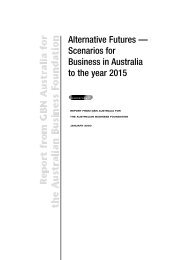Teaching for uncertain futures - Neville Freeman Agency
Teaching for uncertain futures - Neville Freeman Agency
Teaching for uncertain futures - Neville Freeman Agency
Create successful ePaper yourself
Turn your PDF publications into a flip-book with our unique Google optimized e-Paper software.
viiPREFACEPrefaceHedley BeareEmeritus Professor and Honorary FellowFaculty of Education, University of MelbourneA brief history of the future is the beguiling title of Oona Strathern’s 2007 bookwhich gives an account of how our attitudes towards the future have changed,particularly over the past hundred years. No matter in what field we work now,we must be seriously concerned about the trendlines affecting all aspects ofhuman existence. Observations of the changes that our world is experiencingare provided by the following authors.The Meadows Team, authors of theClub of Rome’s The Limits to Growth(1972), found that by 1992 humanityhad already overshot some of theirpredicted sustainability limits, andconclude that because the trends areinterlocking ‘the collapse will arrive verysuddenly, much to everyone’s surprise’.James Lovelock, author of TheRevenge of Gaia (2007), observes thatthe earth community is suffering ‘thefever brought on by a plague of people’and that ‘the great party of the twentiethcentury, with its extravagantoverspending and its war games, is over’.George Monbiot, author of Heat:How to stop the planet burning (2006),claims we may already have started thechain-reaction which could incineratemany life-<strong>for</strong>ms, including the human,and it will need quick and drastic actionto head off the possibility.James Martin in The Meaning of the21st Century (2006) itemises fifteentrends which have to be addressedurgently – like a devastated planet,closing the extreme poverty gaps,controlling the explosion in the world’spopulation, and managingcomputerised intelligence.Sir Martin Rees, author of Our FinalCentury (2003), speculates whether thehuman species will survive beyond theend of this century, largely because ofhuman factors – like technologiesgetting out of hand; ‘multiplier’infections being set off unwittinglyespecially in the ‘congestedmegacities of the developing world’;disasters triggered by humanincompetence; the ‘disruptivecapabilities’ possible from individualsskilled in genetics, bacteriology,and computers; and inventionslike the quantum computer.Clearly, business as usual is not a survival option. More particularly, schoolscannot af<strong>for</strong>d to be complacent as they are responsible <strong>for</strong> educating the nextgeneration of the world’s citizens. For them to live happily in the 21st century,they must face issues like the fact that by 2050 developing countries couldcontain 86.5 per cent of the globe’s galloping population explosion; that bythen there could be more people living in Asia and Africa than the combinedpopulation of the whole world this year. These students will be globally orientedin a way we never conceived of in the 20th century, and what they must learn atschool has changed dramatically.Ray Kurzweil, author of The Ageof Spiritual Machines, WhenComputers Exceed Human Intelligence(1999) predicts that by 2020 we willhave computers that exceed theprocessing power of the human brain,and that technobiology may transcendhuman capacities beyond what wecan imagine.



